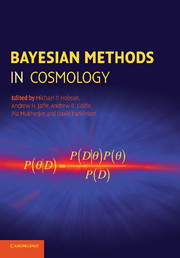Book contents
- Frontmatter
- Contents
- List of contributors
- Preface
- Part I Methods
- 1 Foundations and algorithms
- 2 Simple applications of Bayesian methods
- 3 Parameter estimation using Monte Carlo sampling
- 4 Model selection and multi-model inference
- 5 Bayesian experimental design and model selection forecasting
- 6 Signal separation in cosmology
- Part II Applications
- Index
6 - Signal separation in cosmology
Published online by Cambridge University Press: 11 April 2011
- Frontmatter
- Contents
- List of contributors
- Preface
- Part I Methods
- 1 Foundations and algorithms
- 2 Simple applications of Bayesian methods
- 3 Parameter estimation using Monte Carlo sampling
- 4 Model selection and multi-model inference
- 5 Bayesian experimental design and model selection forecasting
- 6 Signal separation in cosmology
- Part II Applications
- Index
Summary
Signal separation is a common task in cosmological data analysis. The basic problem is simple to state: a number of signals are mixed together in some manner, either known or unknown, to produce some observed data. The object of signal separation is to infer the underlying signals given the observations.
A large number of techniques have been developed to attack this problem. The approaches adopted depend most crucially on the assumptions made regarding the nature of the signals and how they are mixed. Often methods are split into two broad classes: so-called blind and non-blind methods. Non-blind methods can be applied in cases where we know how the signals were mixed. Conversely, blind methods assume no knowledge of how the signals were mixed, and rely on assumptions about the statistical properties of the signals to make the separation. There are some techniques that straddle the two classes, which we shall refer to as ‘semi-blind’ methods. They assume partial knowledge of how the signals are mixed, or that the mixing properties of some signals are known and those of others are not.
There is a large literature in the field of signal processing about signal separation, using Bayesian techniques or otherwise. For any cosmological signal separation problem, it is almost always the case that someone has already attempted to solve an analogous problem in the signal processing literature. Readers who encounter a problem of this type, which is not already addressed in the cosmological literature, are encouraged to look further afield for existing solutions.
Information
- Type
- Chapter
- Information
- Bayesian Methods in Cosmology , pp. 126 - 164Publisher: Cambridge University PressPrint publication year: 2009
